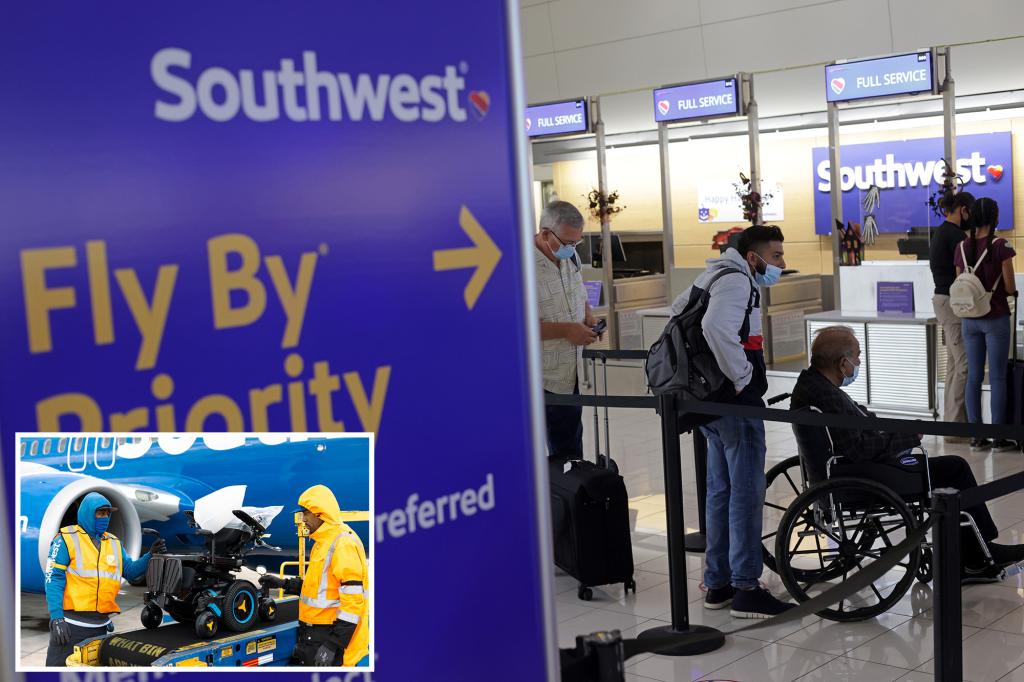Plane passengers who use wheelchairs will soon have to take one more step before boarding.
Southwest Airlines announced that anyone using a lithium-powered mobility device will have to remove the batteries and carry them into the cabin before checking in their wheelchair.
The new policy, taking effect on Sept. 25, puts Southwest in line with international safety standards and is part of a continued effort to reduce the risk of fire onboard.
“Lithium batteries have become one of the most common sources of smoke and fire incidents on aircraft,” Dave Hunt, Southwest’s vice president for safety and security, said in a message to employees on Sept. 12, USA Today reported.
“While these events are rare, quick access and visibility are critical to keeping everyone onboard safe. By taking proactive steps now, Southwest will be among the first US carriers to adopt these higher standards.”
The carried-on wheelchair battery won’t count toward a passenger’s carry-on allowance.
Under the new policy, the size of lithium batteries permitted on flights must be 300 watt-hours or less, though there will be a grace period for those who might need to get a new mobility device due to the restriction.
“To ease the transition, customers with batteries larger than 300 watt-hours will have a grace period through Jan. 11, 2026, while all batteries under the 300 watt-hour limit must follow the new process,” a statement from the airline said. “After Jan. 11, devices with batteries above the limit will no longer be accepted for transport.”
Southwest previously announced that lithium power banks need to be visible onboard when they’re being used.
The change comes as the TSA banned portable chargers and power banks that use lithium batteries from checked luggage following an advisory from the Federal Aviation Administration.
“When a carry-on bag is checked at the gate or at planeside, all spare lithium batteries and power banks must be removed from the bag and kept with the passenger in the aircraft cabin. The battery terminals must be protected from short circuit,” the FAA said.
As the FAA explained, lithium-ion batteries pose a fire risk in the cargo hold as they are capable of overheating and undergoing a process called thermal runaway.
Thermal runaway can happen without warning, and there are multiple factors that can trigger it, including if the battery is damaged, overheated, exposed to water, overcharged, improperly packed, or has experienced manufacturing defects.
The FAA warned airlines last week that they need to assess the electronics fire safety procedures and messaging.
While rules vary by airline, American Airlines, Delta Air Lines and United Airlines also have restrictions for mobility devices.
Meanwhile, it was also announced that the TSA will no longer require passengers to remove their shoes at agency checkpoints, even if they don’t have TSA PreCheck. Plus, Homeland Security Secretary Kristi Noem suggested that she is pushing the TSA to ease up on its liquids, aerosols and gels rule.
Southwest also announced that starting Oct. 24, the Dallas-based carrier will offer free in-flight WiFi across its fleet, doing away with its $8-per-flight fee for internet access, if you are a Rapid Rewards loyalty member.
The carrier’s decision to launch free WiFi fleet-wide comes months after they did a test trial to see if the internet service could keep up with the demand when available for free.
Complimentary WiFi will be welcome news to Southwest passengers after dealing with some unpopular moves from the airline, such as ending its decades-old “bags fly free” policy and its pick-any-seat policy.
Read the full article here

